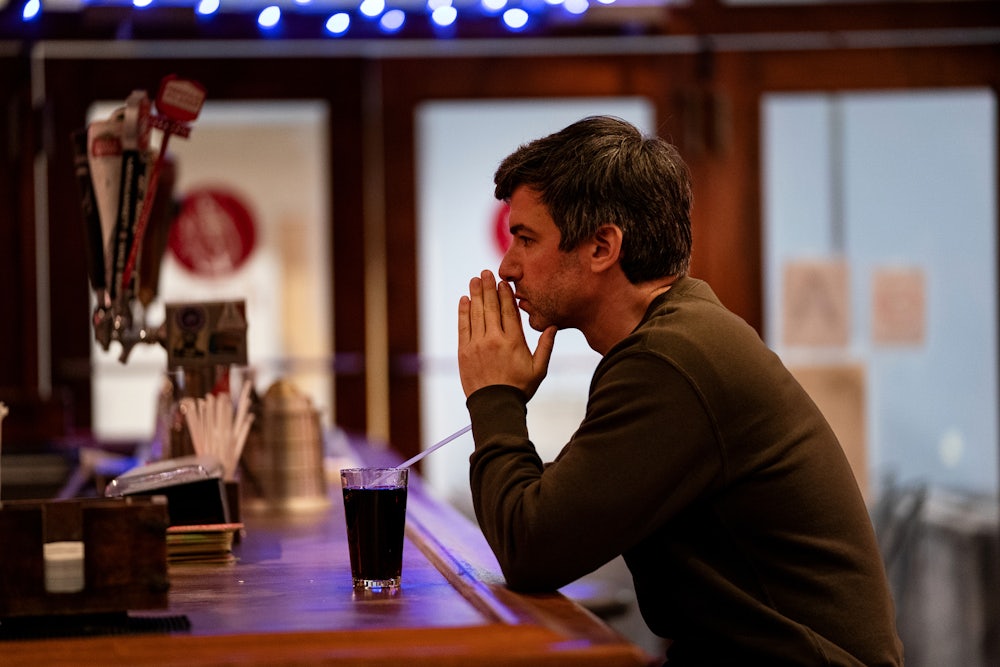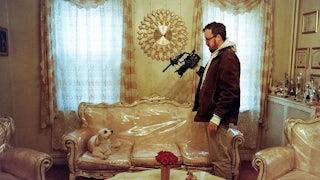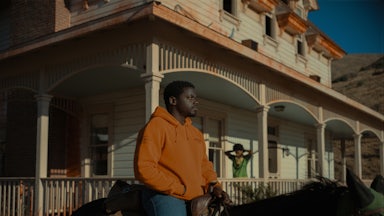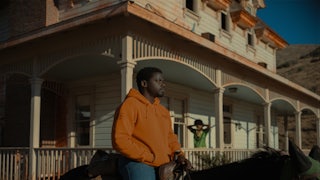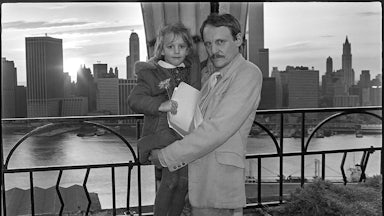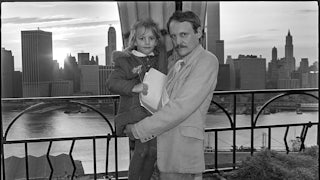A few years ago, at a bar on Toronto’s Ossington Avenue, I had the good fortune to see Nathan Fielder sing Kate Bush at karaoke. A veteran of the city’s comedy scene, Fielder was returning as something of a conquering hero. His Comedy Central series, Nathan for You—in which he played a fictional version of himself, promising to revive the fortunes of struggling L.A.-area businesses with outlandishly elaborate promotional schemes—was a critical hit. Watching the stone-faced Fielder wail the lyrics of “This Woman’s Work” (“I should be crying, but I just can’t let it show”), I couldn’t help but wonder: Is this for real?
The question haunts Fielder’s work. He’s in the business of blurring reality and fiction, absurdity and exploitation. Nathan for You marshaled real people (who knew they were on TV but were unaware that they were on a comedy program and not a real reality show) in the service of its increasingly bewildering plots. In one episode, Fielder aids an importer of smoke alarms in lowering shipping costs by reclassifying the device as a musical instrument—a plan that involves recruiting oblivious musicians to record a one-off single that features a shrill, intermittent beep.
In another, called “Smokers Allowed,” Fielder circumvents a cigarette smoking ban by casting regulars of a small Pasadena dive bar in a free-form theatrical performance of an average night at a dive bar. To complete the illusion, Fielder adds a curtain and plush seating, accommodating spectators who believe they are watching a piece of experimental theater. The audience of two thrills at the slice-of-life performance, and Fielder doubles down. He hires actors and restages the entire evening, choreographing the last banal detail. In its unbelievable dovetailing of intricacy and inanity, “Smokers Allowed” plays like a proof of concept for The Rehearsal, Fielder’s new six-episode series on HBO.
The Rehearsal sees Fielder using cryptic Craigslist ads to recruit real people whose anxieties are holding them back in life. In the first episode, a 50-year-old Brooklyn teacher named Kor Skeet takes the bait. He’s been lying to members of his bar trivia team about having a master’s degree. And he wants to confess. So Fielder and his crew construct a 1:1 replica of the bar that hosts the trivia night, where Kor can practice his confession. The replica bar is filled with actors, including one playing Kor’s teammate, with whom he can prepare for every eventuality—how to react if she’s angry, how to react if she’s willing to forgive him, what to say if the conversation runs dry. They plan the night down to the last detail—which table Kor will sit at; the drinks he will order before his friend arrives. “If you plan for every variable,” Fielder explains, in his trademark monotone, “a happy outcome doesn’t have to be left to chance.”
Kor isn’t the only one who rehearses his role in the show. Fielder also rehearses before his meetings with Kor. He hires a “Fake Kor”—an actor who has studied the real Kor’s speech patterns and copies his clothes—and uses him to test out conversational pathways and help fine-tune his own “portrayal of vulnerability.”
The idea that an elaborate system of chicanery might spur someone to honesty seems the dramatic and theoretical center of The Rehearsal. But as the show develops, and its complications deepen, it rises above this conceit. Fielder is working in an altogether different mode. The show is not just a work of metafiction but an unsparing piece of self-criticism.
With its bait-and-switch premise, Nathan for You was dogged by accusations of cruelty. Viewers naturally wondered if the business owners knew just what they were getting into. One critic called the premise “borderline mean-spirited.” Reviewing the show’s two-hour finale—in which Fielder breaks format and undergoes an epic quest to help an aging Bill Gates impersonator find a long-lost love—documentarian Errol Morris described Fielder’s ability to push the limits of cringe and credulity “disturbing.” (He meant it as a compliment.) A recent profile of Fielder for New York magazine quotes an unwitting Nathan for You mark, who derides the host as “a nasty trickster.” While Fielder is ostensibly spoofing the reality TV business-reno format, one could argue that guests on shows like Bar Rescue and Kitchen Nightmares at least know what to expect: They know they’ll be dressed down by a tense, howling man and that their indignities will be rewarded with a big-ticket renovation and a new lease on life. Nathan for You offered no such contract, implicit or otherwise.
If The Rehearsal is an evolution of Nathan for You, it also feels like an apology for it. In his earlier show, Fielder’s awkwardness, alienation, and pathetic desire for human connection (in one episode, a no-nonsense P.I. dubs him “the wizard of loneliness”) serve as subtext, and a running gag. The Rehearsal foregrounds these feelings. And as it progresses, The Rehearsal becomes a show not about helping people but about its creator’s own anxiety, vanity, and compulsive fetish for control. That “disturbing” quality Errol Morris identified is cranked up, as Fielder’s egotism swells to fill the screen.
More than socially inept, Fielder this time around plays something closer to a sociopath: someone whose desire to systematically understand human feeling scans as almost alien. In the second episode, Fielder is entrusted with helping a woman named Angela live through a two-week trial run of what it might be like to raise a child, from birth to adulthood. Child actors can only work for a certain number of hours at a time, so the babies in this scenario are switched out at regular intervals throughout the day, when the would-be mother isn’t looking. Fielder’s team swarms a rural farmhouse with SWAT-like urgency, furtively swapping children out through the window. As the week goes on, they use older actors, to create the impression that the child is growing up in accelerated form—a couple of years every few days.
As Angela’s interest in her own rehearsal wanes, Fielder only grows more committed. If something’s not working, he insists, it’s because the scenario itself is not real enough; because some detail or nuance escaped him. He plays with the idea that he can manufacture genuine emotional attachment as long as the set dressing is spot-on. To take just one example: In order to complete the illusion that Angela is fully inhabiting her maternal fantasy, which includes growing her own vegetables in a small garden plot, Fielder’s team tills the soil, plants the seeds, and then, under cover of darkness, swaps the crops for replacements sourced from a supermarket. When Fielder notices a produce sticker glaring at him from a bell pepper—the sort of sloppy missed detail that could give away the whole game—he merely turns the pepper on its side. If no one sees the problem, then it does not exist.
The Rehearsal becomes a send-up of its star’s own social anxiety and of his desire to alleviate it by stage-managing a watertight simulation of reality. “After spending time with people,” Fielder laments, “I’m often left wondering what they actually think of me.” Yet the only way his character can imagine finding this out is through a series of ever more complex ruses, rather than by simply observing the way people respond to him in real-life encounters. In time, The Rehearsal pushes Fielder’s performance of his own discomfort, alienation, and egotism to the point of eerie absurdity: rehearsals within rehearsals, wailing robot babies, a pop-up acting school offering courses in the “Fielder Method,” and even a Fake Nathan that serves as an idealized avatar of its creator.
His absurd performance ends up affirming how much of human life is defined by spontaneity, chance, and sparks of happenstance that defy control. By repeatedly crossing social lines, he recognizes their existence.
On paper, The Rehearsal merits comparisons to various docu-fiction hybrids, from Luis Buñuel’s Las Hurdes (1933) to Jim McBride’s David Holzman’s Diary (1968), Werner Herzog’s Little Dieter Needs to Fly (1997), and Joshua Oppenheimer’s The Act of Killing (2012). In different ways, these films raise questions about the boundaries between fiction and reality, and the ethics of the documentary form. As the documentarian Robert Greene recently put it on Twitter, “Pretty much every great documentary is on some level about how it maybe shouldn’t exist.”
Fielder entertains such high-minded ideas—up to a point. The Rehearsal offers its own sharp comment on the invisible power dynamics undergirding any creative enterprise—or, indeed, any social interaction. The show’s “real people” repeatedly defer to Fielder, precisely because it’s his show and he (presumably) knows what he’s doing, even if he’s making it up as he goes along. During one extremely involved rehearsal, he mulls the pressures placed on actors signing appearance releases for his own show, and how their basic right to privacy can be quickly written off when they’re faced with the prospect of appearing on a real-deal HBO “reality” show.
But for Fielder, the only way out of his labyrinthine simulation is through. Instead of pulling back, The Rehearsal leans into its most uncomfortable dynamics, aware that its most excruciating moments of boundary-crossing are the core of its appeal. The show is peppered with tells and tip-offs that speak to its creator’s finely tuned self-awareness. There are references to its star’s compulsive lies, comparisons to madman chocolatier Willy Wonka, glimpses of kids’ TV shows preaching the importance of honesty. In the first episode, Fielder trains the “Fake Kor” to tell him, point blank, “You’re an awful, awful person.” The character Fielder plays with such conviction doesn’t seem to know any better. But, The Rehearsal suggests, shouldn’t we?
